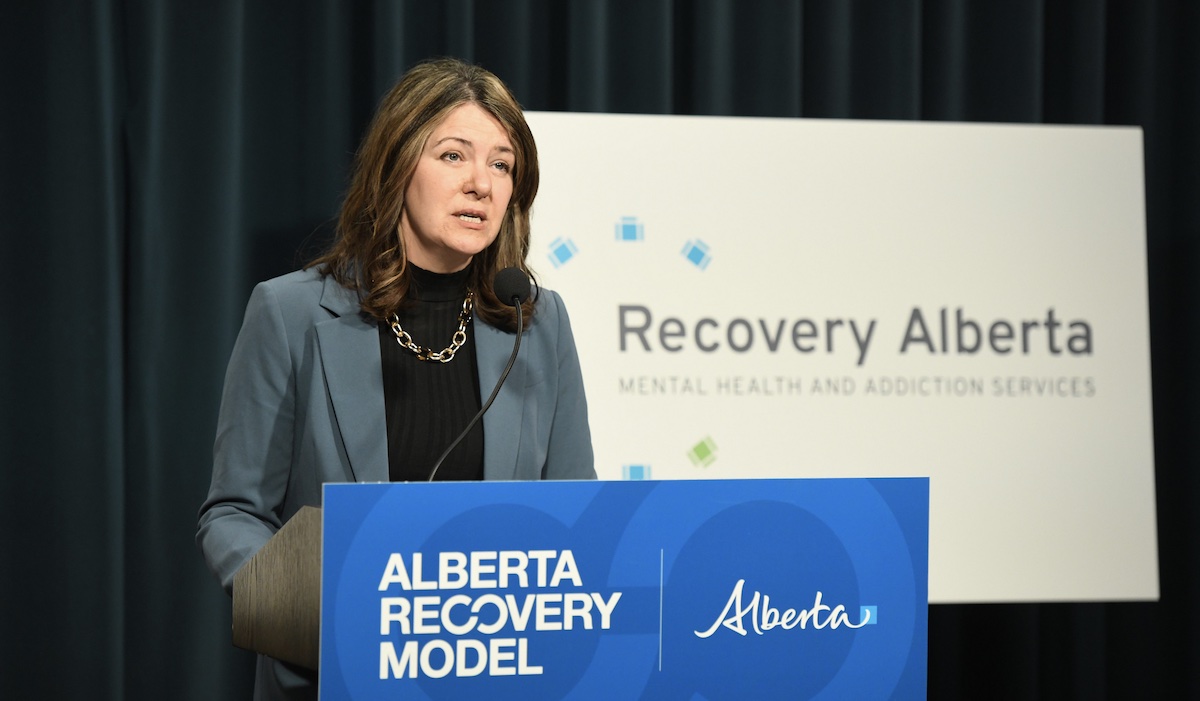Alberta’s United Conservative Party (UCP) government is about to carve more than 10,000 employees and $1.13 billion out of Alberta Health Services (AHS) to create what looks like a drug-treatment hobbyhorse for a small group of ideologues in the office of Premier Danielle Smith.
Never mind that the hurried and badly thought-out creation of the “Recovery Alberta” mental health care silo announced by Premier Smith and Mental Health and Addiction Minister Dan Williams yesterday morning will sow chaos and inefficiency throughout AHS.
Or that the new Canadian Centre for Recovery Excellence, announced at the same news conference yesterday, has been given a contradictory assignment.
“Simply put, CORE will evaluate what works, and what does not work, when it comes to helping individuals with addiction and mental health concerns,” said the Crown corporation’s new CEO, Kym Kaufmann, during the government’s press conference.
Moreover, she said right after that, “it will help the Government advance the Alberta Recovery Model.”
But since the so-called Alberta Recovery Model into which the Premier’s Office is sinking so much political capital isn’t working now and isn’t likely ever to work, this is all but an admission that CORE, its name and purpose seemingly inspired by Jason Kenney’s notorious Canadian Energy Centre, will turn out to be another specialized UCP propaganda operation massaging cherry-picked data.
Similarly, in the government’s press release, Williams, best known before his appointment to cabinet as an anti-abortion crusader, boasted that “Alberta is leading the country with the development of the Alberta Recovery Model to address mental health and addiction challenges.”
As Alberta Friends of Medicare Director Chris Gallaway put it in perspective yesterday, while the announcement “purportedly reiterated the importance of data and evidence, in reality, this government’s track record shows a repeated refusal to follow the best evidence, and a continued unwillingness to make treatment data available to Albertans.”
“What remained conspicuously unmentioned,” Galloway noted, “was the fact that in 2023, Alberta saw our highest ever number of drug poisoning deaths.”
The plans announced yesterday were just in time for the opening today of a national conference in Calgary known for its emphasis on abstinence-based inpatient addiction treatments delivered by private businesses.
Surely not by chance, one of the keynote speakers this afternoon at the Recovery Capital Conference will be Premier Smith’s chief of staff, Marshall Smith, a controversial advocate of the “recovery movement” and fierce opponent of harm-reduction approaches to addiction.
The Smith Government bills the hiving off of all of AHS’s mental health services and facilities as part of its effort to “refocus” mental health care. Still, AHS’s chief program officer for addiction and mental health and correction health services, Kerry Bales, will return as the CEO of Recovery Alberta, the news release said.
It’s said here, the result is likely to blur the vision considerably in many Alberta communities since addictions care will no longer be an integral part of the health care system.
Recovery Alberta certainly creates an opportunity for the government to direct public funds into a confusing welter of unregulated private-sector contractors that will make it difficult for the public to know where the money has gone.
Recovery Alberta is to be the first of three new silos that along with the diminished AHS are at the core of the Smith Government’s strategy to break up and fragment public health services in the province.
Recovery Alberta will be implemented on a very quick timetable, supposedly with affected AHS employees transferred to the new employer by next July. The result, health care unions warned yesterday, will be chaos.
“Every AHS nursing employee will be impacted directly or indirectly by this decision to hive off mental health and addiction services into a separate organization, and it appears there was a serious lack of in-depth planning,” said United Nurses of Alberta (UNA) President Heather Smith on the union’s website.
A government Frequently Asked Questions document published on UNA’s website advised unionized employees likely to be impacted by the change of employers that “your current union and collective agreement will transfer unchanged to the new organization.”
But the UNA statement warned that “it is not clear how this will work and how it can be possible without negotiated changes to the collective agreement or government interference.”
More than 3,200 Registered Nurses and Registered Psychiatric Nurses will be impacted by the change of employers, UNA said.
Health Sciences Association of Alberta President Mike Parker said in a statement that “we were shocked to hear the premier and minister of mental health and addictions announcing these sweeping changes this morning.
Parker told HSAA members that “when the plans to restructure health care were first announced, this government and AHS assured us that your union would be consulted and informed throughout the process.” But, “despite previous promises from the minister of health and the premier your union was not informed in advance of this significant change.”
About 3,400 HSAA members will have to transfer to the new employer.
The Alberta Union of Provincial Employees said the changes announced yesterday will impact 3,500 of its members, about 2,000 in nursing care and 1,500 in general support services.
“It’s crystal clear from today’s announcement that the government feels it does not need to consult with front-line workers before doing what it already decided to do,” said AUPE Vice-President Sandra Azocar. “These are ideologically driven decisions, not evidence-based decisions.”
It’s reasonable to predict that the labour relations structure of Recovery Alberta will not be in place by July 2024.
The government says virtual engagement sessions for AHS staff and service providers will be held on April 11, 16, 17 and 22.



